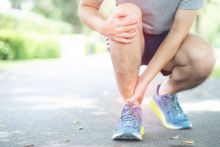
Knee arthritis is one of the most common diseases to affect adults over the age of 50. It can seriously impact a person’s mobility, making it difficult to enjoy everyday movements like standing, walking, and exercising.
There are many causes that can lead to arthritis including trauma and rheumatological conditions, however, the most common is osteoarthritis. Osteoarthritis (OS) is typically genetic and is considered degenerative, or a “wear and tear” type of arthritis.
Arthritis occurs when cartilage (the outer coating on the end of the bones that allows for smooth movement of the joints) breaks down or degrades, exposing the bone and causing inflammation and pain in the joint. As the smooth surface becomes disrupted, motion in the knee becomes affected.
The most common symptoms of knee arthritis are pain and stiffness which are worse in the morning and improve throughout the day. Other symptoms include swelling, catching and even locking — when the knee gives way and buckles — can occur. If pain is severe, it can cause limping and may lead to the use of a cane. High-impact activities such as running, tennis, and basketball can cause flare ups.
When experiencing pain, avoid activities that cause symptoms. Though, it is still important to remain active and keep the joints mobile. Anti-inflammatories, such as ibuprofen, can be taken to decrease pain and inflammation during activity. Physical therapy can help improve motion and strength, and muscles around the knee like the quadriceps and hamstrings may be targeted to help alleviate load on the knee joint. Weight loss can also reduce symptoms and improve quality of life.
Procedures are available if medications and therapy stop being effective. A steroid shot can be injected into the joint, decreasing any swelling around the knee. Hyaluronic acid, a molecule used in cartilage production, can also be injected into the knee to help decrease cartilage degradation and inflammation. Newer technologies, such as Platelet Rich Plasma (PRP) and stem cells, have shown promising results as well.
Surgery is recommended for persistent symptoms, especially when the pain interferes with your quality of life. Less invasive surgery like knee arthroscopy can be performed on patients with less severe arthritis, while patients with more advanced arthritis may benefit from knee replacement.
Living with knee pain is not something you need to endure. Whether your movement goals involve skiing with your grandchildren or gardening, there are ways to overcome chronic pain. Speak with your care provider to understand what options may be best for you.
For more information, visit BartonOrthopedicsAndWellness.com.
Visit Visit BartonOrthopedicsAndWellness.com



 Kyle Swanson, MD, FAAOS is a board-certified orthopedic surgeon with Tahoe Orthopedics & Sports Medicine. He is a sports medicine specialist treating knee, hip, and shoulder conditions in Carson City, Zephyr Cove, and at the Center for Orthopedics & Wellness in
South Lake Tahoe, CA. Dr. Swanson performs knee replacements with Mako SmartRobotics™, which enables surgeons to have a more predictable surgical experience with increased precision and accuracy for total knee, total hip, and partial knee replacements.
Kyle Swanson, MD, FAAOS is a board-certified orthopedic surgeon with Tahoe Orthopedics & Sports Medicine. He is a sports medicine specialist treating knee, hip, and shoulder conditions in Carson City, Zephyr Cove, and at the Center for Orthopedics & Wellness in
South Lake Tahoe, CA. Dr. Swanson performs knee replacements with Mako SmartRobotics™, which enables surgeons to have a more predictable surgical experience with increased precision and accuracy for total knee, total hip, and partial knee replacements.



